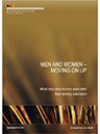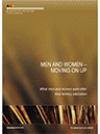This report looks at the earnings and outcomes for young men and women who complete a qualification in the New Zealand tertiary education system. It replicates the methodology of Moving on up – what young people earn after their tertiary education (Mahoney et al, 2013) to examine differences in incomes and employment rates for different types of qualifications by gender.
Key Results
- Young male domestic graduates who completed qualifications earned more than equivalent female graduates after study.
- In the first year after study women’s earnings often grew faster than men’s, but men’s earnings rose faster over a longer period of time. Men earned more than women at all qualification levels by five years after study.
- The difference in earnings between men and women varied by the level of qualification completed. It was narrowest at the bachelors degree level.
- Five years after study, the difference between men and women was widest for doctorate and masters degree graduates, and for level 1 to 3 certificate holders.
- Earnings also varied by field of study between men and women at each level. For example, male medical studies bachelors graduates earned 8% more than women after five years, and male law bachelors graduates earned 7% more. Women earned more than men after five years if they completed bachelors degrees in veterinary studies or rehabilitation studies, among others.
- Returns to study were greater for women than for men. By this, we mean that women earned more compared to the national median income for women than men.
- What people do after study also differed between men and women. Destinations were similar between men and women in the first year after study overall but differences grew in later years.
- Men who completed lower level qualifications were more likely to be employed than women five years after study. But women were more likely to be employed than men after completing higher level qualifications.
- The likelihood of being overseas after five years was higher for men than for women. Half of all male doctorate completers were overseas by the fifth year after study, compared to nearly a third of women.
- The likelihood of receiving a welfare benefit was not much different between men and women.


